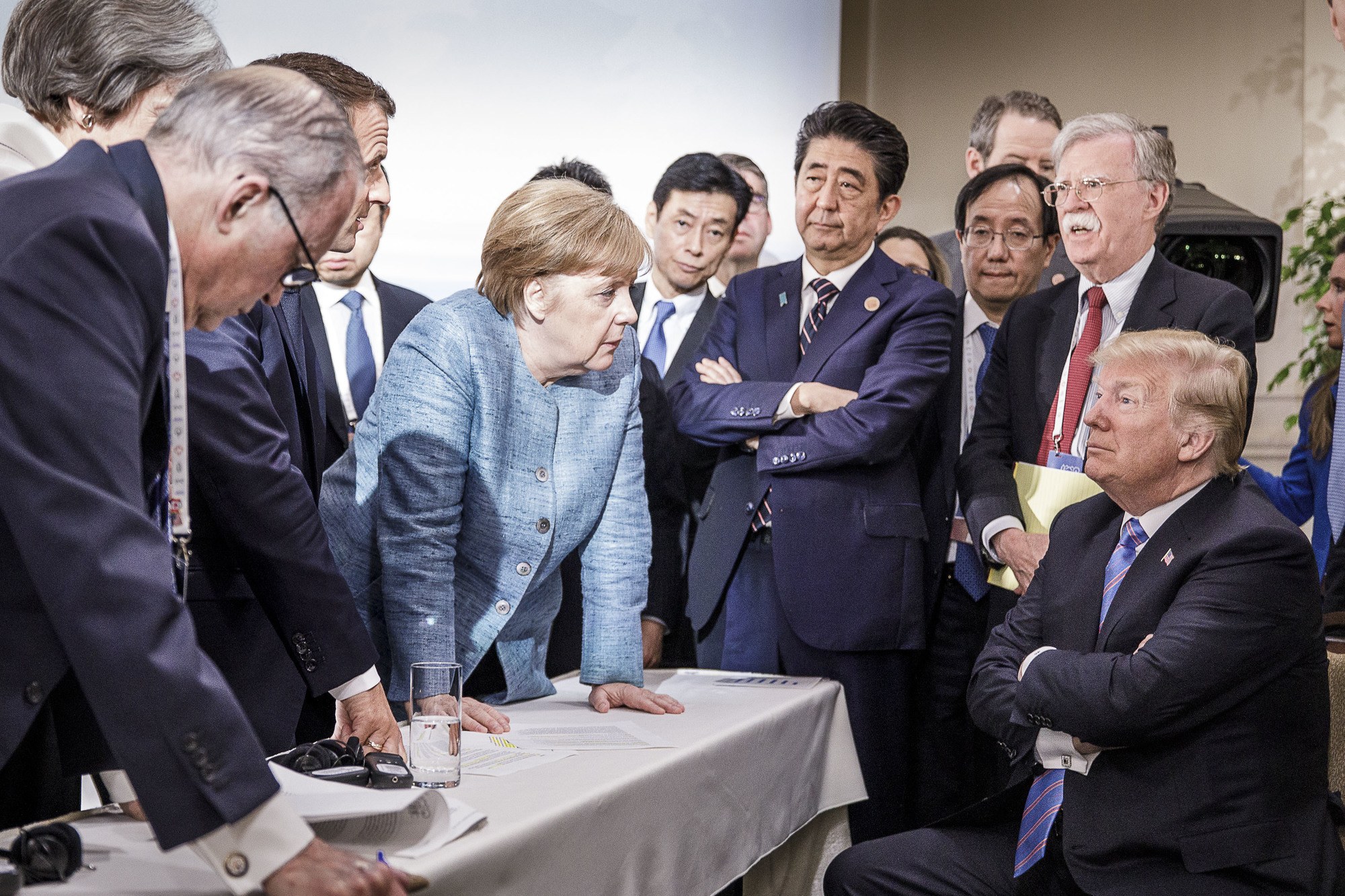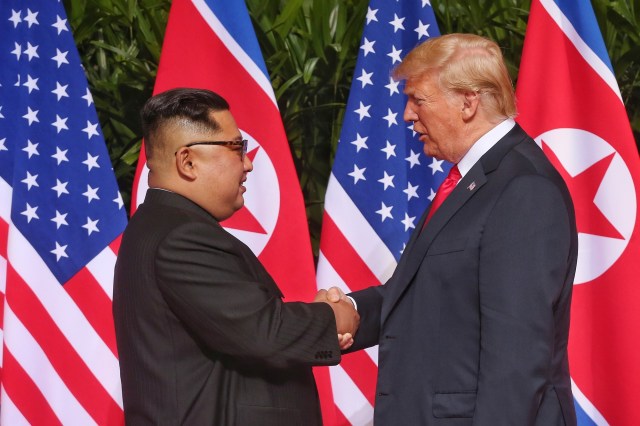Kim Jong-un and Donald Trump meet in Singapore. Credit: Handout / Getty

In Singapore, President Trump demonstrated that the art of the deal consists in manoeuvring a single opponent into a favourable negotiating position. No one who has studied him ought to be surprised. This is the business strategy that has made him rich.[1. In The Art of the Deal(1987), with journalist Tony Schwartz, Trump gives his “11-step formula” for success: Think big; Protect the downside and the upside will take care of itself; Maximise your options; Know your market; Use your leverage; Enhance your location; Get the word out; Fight back; Deliver the goods; Contain the costs; Have fun].
It was quite a different scenario, though, the preceding week at the G7 meeting. Possibly this is because Trump is far better at focusing on the single issue and the single opponent, and far less able to deal with multi-faceted issues and disparate “opponents”. And it’s also possible that the G7 spat was, in part, an invention to signal to Kim Jong-un that this Mr President was not to be messed with.
But let’s not forget how easy it is easy for heads of government, European heads in particular, collectively to upset US presidents. Anything that smacks of Minerva speaking to Mars sparks the tinder, particularly if from the British, for it harks back to colonial days: “These country clowns cannot whip us”, said Lord George Germain, Secretary of State for the America Department, unhelpfully (and inaccurately) in 1775.
Their jokes don’t help much either. Back in 1919, at the peace conference at Versailles, President Woodrow Wilson, notoriously stiff and vain, was still smarting about a joke made by a British diplomat in Washington that had done the rounds a couple of years earlier and he had somehow got wind of. Wilson, a widower, had recently remarried. “What did the new Mrs. Wilson do when the President proposed?” ran the gag. Answer: “She fell out of bed with surprise.”

The same sort of joke at the First Lady’s expense today would send Donald Trump ballistic on Twitter, as many of the jokes against him do. I suspect, however, that has a much thicker skin than he is given credit for – far thicker than the prissy Wilson had. Yet Trump kicks against the pricks. He does it partly as a way of batting away the constant ad hominem insults. But also, I think, for sport. Remember that his 11th rule of deal-making is to “Have fun”. Perhaps that is, in part, what he was up to in Quebec.
You can see this attitude, too, in Trump’s selective and arch quoting of history. He told the New York Times that the reason for the failure of Bonaparte’s Russian campaign of 1812 was that “he didn’t go to Russia that night because he had extracurricular activities, and they froze to death”. This, I think, says more about Trump’s contempt for the NYT and his cavalier attitude generally, than of his actual knowledge.
Trump will, at least, share the received wisdom when it comes to America’s involvement in the two world wars. He will know about Wilson’s great expectations on going to the Versailles peace conference at the end of the First World War, and how he was worn down by the “perfidy” of the major allies and the tiresomeness of the minor ones. But above all, Trump will know of the ultimate failure of Wilson’s big idea – the League of Nations.
The comparisons between Quebec and Versailles are indeed striking, although the views of the president and the other principals on a rules-based international order were reversed. In the same way that the leaders of the G7 were already discomposed by Trump’s unilateralism on tariffs and trade, in 1919 the British, French and Italian prime minsters – Lloyd George, Clemenceau, and Orlando – were wary of Wilson’s high-minded intentions to impose a new world order.
Wilson had first tried to broker a peace in 1916 when the Germans made a wholly disingenuous proposal for a negotiated settlement, which both the British and French peremptorily rejected. Then, when the US entered the war in April 1917, Wilson began working on a set of war aims which he promoted as a way to permanent peace rather than simply a new balance of power. In January 1918, Wilson announced his war aims to Congress, his famous “Fourteen Points”, the most important of which – to Wilson at least – being the final one: “A general association of nations to be formed to guarantee to its members political independence and territorial integrity” – the League of Nations.
The European allies were at once sceptical and anxious. There was, for a start, no mention of reparations. Consequently, at Versailles a year later, with Wilson sticking to his Fourteen Points agenda, the proceedings were far from smooth. Unlike the G7 at Quebec, though, where Trump repudiated the message of the final communiqué underlining “a rules-based international order”, at Versailles it was the Europeans who were least interested in a rules-based League of Nations. They went along with it chiefly to get Wilson’s support for their own demands on reparations and redrawing the maps.
Because of Wilson’s high-minded obsession with rules, however, he failed to see the reality of a far-from peaceful Europe. In consequence, the treaty with Germany was on the one hand too harsh and on the other too lenient, giving the new Weimar Republic both cause for brooding and scope for revanchism.
But the real blow came when Wilson returned to Washington in July 1919 and found that the Senate would not back American participation in the League of Nations. Republicans and some Democrats dismissed it as “Colonel” House’s crazy idea (House had been Wilson’s envoy since before the war and was hugely influential on his thinking) nicknaming Wilson “the Jack that House built”.
While you might think Trump and the prissy Presbyterian former president of Princeton University couldn’t be more different, there are in fact striking similarities in how they conduct their affairs. “Colonel” House said that Wilson was only receptive to other perspectives while in the process of making a decision. Once he’d made that decision, it was immutable, no longer open to discussion by anyone. While some admired that as decisiveness, others believed it to be egotism of the most dangerous kind. At Versailles, one French diplomat said that Wilson would have made a great tyrant, in that he had no concept at all that he could ever be wrong.
Trump will know of Wilson’s humiliating failure to get his prize Versailles project approved by Congress, for it is a keystone of American history. He will also know that in addition to this, Wilson’s failure to anticipate the possibility of German revanchism – ending up with peace terms that both fuelled yet could not contain German resentment – was a huge contributory factor in the rise of Hitler. It was why FDR was so adamant on the unconditional surrender of the Germans and Japanese, rather than a negotiated peace – another tenet of American history.
Trump’s historical instinct will, therefore, be to despise rules-based arrangements, which to him smack of mere process. (For that, indeed, was what the Senate saw in the League – process – and what the terms negotiated with Germany turned out to be). Add to that, American presidential wariness (to say the least) of heads of other governments acting collectively in their own individual interests – interests that appear to be rooted in the past (and a failed past at that) – and you get an ugly scene like Quebec.
And yet, with an infinitely more lethal problem such as North Korea’s nuclear weapons, Trump will feel on surer ground. Yes, he’s traded insults with Kim Jong-un, but public name-calling, however unedifying, is less insidious than backstairs sneering. We, the rest of the G7, should stop worrying that Trump’s behaviour in Quebec means he doesn’t understand international relations. On the contrary: it suggests that, like FDR, he has taken on board the lessons of Versailles, and that process is not enough. Only results count.
If Kim Jong-un reads history and Trump at Quebec correctly, he will know that Singapore cannot be just another North Korean bluff. If he doesn’t, there will be no peace in our time, and a tyrant’s end for “The Supreme Leader”.










Join the discussion
Join like minded readers that support our journalism by becoming a paid subscriber
To join the discussion in the comments, become a paid subscriber.
Join like minded readers that support our journalism, read unlimited articles and enjoy other subscriber-only benefits.
Subscribe